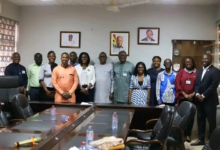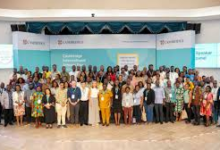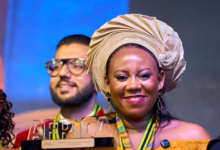KAS warns against misinformation, disinformation
The Konrad Adenauer Stiftung (KAS) has cautioned against the rampant spread of misinformation and disinformation in national and socio-economic discourse, particularly in the age of social media and AI.
The group, therefore, urged stakeholders to intensify public sensitisation, cross-check facts, and differentiate between opinions and factual information before sharing content.
The KAS Country Director, Ms Anna Lena Sabroso-Wasserfall, said failure to do so could contribute to the growing problem of misinformation, disinformation, and malinformation.
She was speaking at a breakfast meeting organised by KAS in Accra to address the challenge of misinformation, disinformation, and their impact on security and democracy in West Africa.
It brought together foreign and local scholars in information and communication technology, artificial intelligence (AI), scientists, and members of civil society organisations, on the theme: ‘The Information Battleeld: Misinformation, Disinformation, and Their Impact on Security in West Africa.’
Nana Yaa Ansua, Secretary of the National Queen Mothers Platform, said the direct engagement of queens with the public positioned them as key stakeholders in addressing false narratives that threatened governance, peace, and national security.
She also highlighted their role in educating communities, mediating conflicts, leveraging social media to counter false information, collaborating with NGOs and government agencies, and empowering women and youth with critical thinking skills.
Dr James Kwabena Bomfeh Jnr, Executive Director of Youth and Disability International, stated that disinformation had distorted historical facts about governance, democracy, and political history, pointing out that even in the UK, authorities struggled to balance freedom of expression with efforts to curb misinformation, disinformation, and malinformation, which could promote hate speech, radicalism, and social unrest.
He said during elections, many voters were influenced by misinformation and disinformation, leading to electoral outcomes that did not necessarily reflect voters’ true intentions.
Dr Bomfeh also noted that political actors exploit false narratives to advance their interests, and the incentive to be dishonest in political discourse was often stronger than the incentive to be truthful.
He then urged individuals to read widely and avoid sharing social media posts without fact-checking, even when the source seemed credible.
Dr Bomfeh also asked elected government officials to be the primary sources of communication, and recommended that appointments to regulatory positions be based on integrity and credibility.
He also called for stricter regulations on media and online platforms to prevent the reckless spread of misinformation.
The KAS Foundation, whose values and principles are rooted in democracy, rule of law, and social justice, organised the event to highlight the detrimental role of misinformation in politics and governance.
The discussion also traced the historical roots of information distortion in Ghana’s political landscape.
A notable example cited was the ongoing debate about Ghana’s democratic history, particularly whether the Aborigines’ Rights Protection Society (ARPS) was founded on August 4, 1897, as some official government documents claim, or whether it was established on a different date and location in Cape Coast, and whether there was a 100 years clause or condition in the bond of 1844.
Participants noted that misinformation and disinformation in elections affected political parties, and also mislead voters, causing them to make decisions based on falsehoods rather than factual party manifestos.
—GNA




